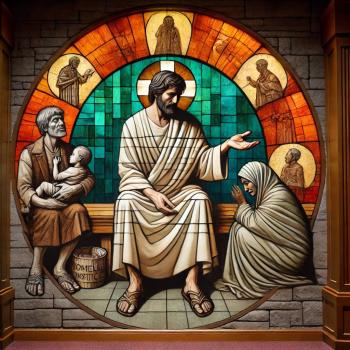According to Frederick Buechner, “Paul WASN’T MUCH TO LOOK AT. “Bald-headed, bowlegged, strongly built, a man small in size, with meeting eyebrows, with a rather large nose.” Years after his death that’s the way the apocryphal Acts of Paul and Thecla describes him.”
Paul traveled to: “Corinth, Ephesus, Thessalonica, Galatia, Colossae, not to mention side trips to Jerusalem, Cyprus, Crete, Malta, Athens, Syracuse, Rome—there was hardly a whistle-stop in the Mediterranean world that he didn’t make it to eventually.”
While he traveled, Paul wrote letters. Today’s scripture comes from his second letter to the church in Corinth.
2 Corinthians 12:2-10
12 2 I know a man in Christ who fourteen years ago was caught up to the third heaven. Whether it was in the body or out of the body I do not know—God knows. 3 And I know that this man—whether in the body or apart from the body I do not know, but God knows— 4 was caught up to paradise and heard inexpressible things, things that no one is permitted to tell. 5 I will boast about a man like that, but I will not boast about myself, except about my weaknesses. 6 Even if I should choose to boast, I would not be a fool, because I would be speaking the truth. But I refrain, so no one will think more of me than is warranted by what I do or say, 7 or because of these surpassingly great revelations. Therefore, in order to keep me from becoming conceited, I was given a thorn in my flesh, a messenger of Satan, to torment me. 8 Three times I pleaded with the Lord to take it away from me. 9 But he said to me, “My grace is sufficient for you, for my power is made perfect in weakness.” Therefore, I will boast all the more gladly about my weaknesses, so that Christ’s power may rest on me. 10 That is why, for Christ’s sake, I delight in weaknesses, in insults, in hardships, in persecutions, in difficulties. For when I am weak, then I am strong.
Paul says he won’t boast, but then goes on to explain, in verse 7, “Therefore, in order to keep me from becoming conceited, I was given a thorn in my flesh, a messenger of Satan, to torment me.”
Paul calls it ‘a messenger of Satan.’ Let me point out that Satan is a derivative of “ha-satan” The Satan, which means ‘stumbling block.’
So, Paul has a stumbling block, a thorn in his flesh.
Scholars have tried to guess what Paul considered the thorn in his side. Some think Paul was married, and his marriage was the thorn. Others think he wasn’t married, and being a bachelor was a thorn in his side.
The thorn in our side represents the thing that stops us. That holds us back, that prevents us from doing God’s will.
We don’t know what Paul’s thorn was, but it distracted him from God and God’s work.
What is our thorn, that distracts us from God’s mission?
For me, one of the tormenting thorns is Sponge Bob Square Pants. He’s iritating, and I had to work hard to keep my nieces and my daughter from being exposed to Sponge Bob Square Pants.
What is the thorn in your side?
It can be anything, or anyone.
It can be the still, small voice in the back of our head that tells us we’re not good enough. That we failed.
The thorn in our flesh could be a person, who has worn us out and gotten on our last nerve.
The thorn in our side could be something we’ve done or something we’ve left undone, and no matter how much we pray, God won’t take it away.
Three times Paul pleaded with the Lord to take away the thorn.
But the Lord told Paul, “My grace is sufficient for you, for my power is made perfect in weakness.”
Therefore, Paul says, I will boast all the more gladly about my weaknesses, so that Christ’s power may rest on me. Paul says, That is why, for Christ’s sake, I delight in weaknesses, in insults, in hardships, in persecutions, in difficulties. For when I am weak, then I am strong.
According to Matthew Henry’s Commentary, “Troubles are sent to teach us to pray; and are continued, to teach us to continue in prayer. Though God accepts the prayer of faith, yet he does not always give what is asked for: as he sometimes grants in wrath, so he sometimes denies in love.”
Have you heard that sometimes the answer to our prayers is ‘no’?
I’m not sure I believe that.
We have to pray in the right way.
“Lord, make my problem go away,” is probably not a good prayer. Because that problem depends on someone else or something else. Your prayer may be contrary to their prayer or the way they may be living their lives. That’s like asking God to make someone love you, when you’re a teenager. It doesn’t work that way, for all sorts of reasons.
But when we pray, “Lord, give me strength to get through my problem,” that’s a prayer the Lord can answer, because God can give us the power and the grace to bear our problems.
The Lord gives us the strength to get through our problems.
“Sometimes the answer to our prayers is ‘no,’” they say. But I say they’re wrong. God says yes, in God’s time, not necessarily our time.
God’s time is different than our time. What may seem like a long time to wait for God to respond to our prayers, may be but a moment to the Lord.
“My grace is sufficient for you, God says to Paul, for my power is made perfect in weakness.”
As they said in my daughter’s day care class – “you take what you get, and you don’t throw a fit.”
Paul is saying we take what we get from God, and we don’t throw a fit.
Stuff happens. Things go wrong – or they go right, and we’re not happy with the result – Stuff happens.
The fact of the matter is we have no control over anything or anyone. Eventually, we barely have control of our own bodies. But what we can control is how we respond to difficult times.
We don’t have control over the actions of others. We can’t control what other people say about us, or what they think about us. We only have control over ourselves. And we don’t throw a fit.
I have a seven-year-old. Everything for her is new and fresh. Life’s disappointments are going swimming in the afternoon, instead of the morning. She has her whole life to figure out life.
When I was in seminary, I interned at the Masonic Home of Virginia. The retirement home for Masons and their wives. The average age was more than 80. This was an exceptionally elderly congregation. I spent time with people, and got to know them. A common theme among the residents was that many of them still hadn’t figured out life yet.
If your seven or seventy, we take what we get, and we don’t throw a fit.
“My grace is sufficient for you, God says to Paul, for my power is made perfect in weakness.”
For many of us, life breaks us down, and God builds us back up again.
When Paul says, “but I will not boast about myself, except about my weaknesses” He’s saying “despite my weaknesses, I am Strong in Christ.
The reality of course is we have no control over anything but ourselves.
Our deepest spiritual insights come from being vulnerable.
Through our suffering, through our pain, we can grow closer to God.
There is peace and happiness to be found, when we fully experience our weaknesses.
Writing this sermon, I was reminded of the words of the Greek poet, Aeschylus, and words he wrote 500 years before Christ.
“He who learns must suffer. And even in our sleep pain that cannot forget falls drop by drop upon the heart, and in our own despair, against our will, comes wisdom to us by the awful grace of God.”
Comes wisdom to us, by the awful grace of God.
“My grace is sufficient for you,” God tells Paul, “for my power is made perfect in weakness.”
God’s power is made perfect in us, through our weaknesses.












